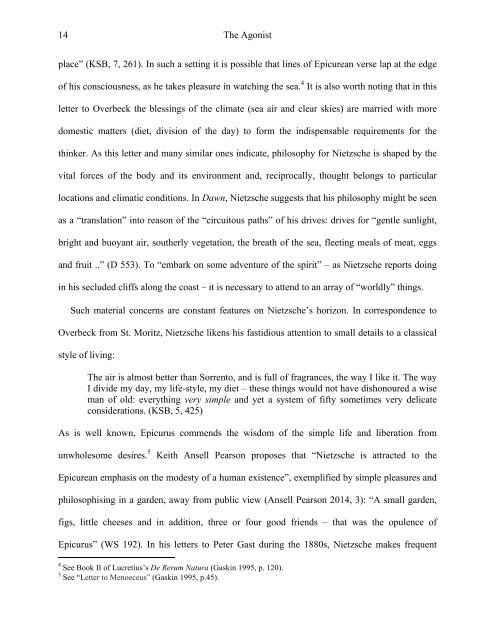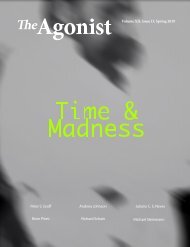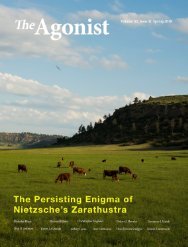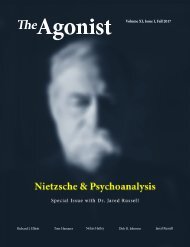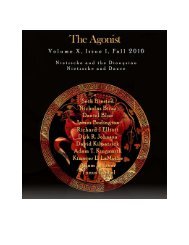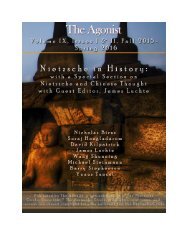Volume X, Issue II, Spring 2017
Agonist Issue: Volume X, Issue II, Spring 2017
Agonist Issue: Volume X, Issue II, Spring 2017
Create successful ePaper yourself
Turn your PDF publications into a flip-book with our unique Google optimized e-Paper software.
14<br />
The Agonist<br />
place” (KSB, 7, 261). In such a setting it is possible that lines of Epicurean verse lap at the edge<br />
of his consciousness, as he takes pleasure in watching the sea. 4 It is also worth noting that in this<br />
letter to Overbeck the blessings of the climate (sea air and clear skies) are married with more<br />
domestic matters (diet, division of the day) to form the indispensable requirements for the<br />
thinker. As this letter and many similar ones indicate, philosophy for Nietzsche is shaped by the<br />
vital forces of the body and its environment and, reciprocally, thought belongs to particular<br />
locations and climatic conditions. In Dawn, Nietzsche suggests that his philosophy might be seen<br />
as a “translation” into reason of the “circuitous paths” of his drives: drives for “gentle sunlight,<br />
bright and buoyant air, southerly vegetation, the breath of the sea, fleeting meals of meat, eggs<br />
and fruit ..” (D 553). To “embark on some adventure of the spirit” – as Nietzsche reports doing<br />
in his secluded cliffs along the coast – it is necessary to attend to an array of “worldly” things.<br />
Such material concerns are constant features on Nietzsche’s horizon. In correspondence to<br />
Overbeck from St. Moritz, Nietzsche likens his fastidious attention to small details to a classical<br />
style of living:<br />
The air is almost better than Sorrento, and is full of fragrances, the way I like it. The way<br />
I divide my day, my life-style, my diet – these things would not have dishonoured a wise<br />
man of old: everything very simple and yet a system of fifty sometimes very delicate<br />
considerations. (KSB, 5, 425)<br />
As is well known, Epicurus commends the wisdom of the simple life and liberation from<br />
unwholesome desires. 5<br />
Keith Ansell Pearson proposes that “Nietzsche is attracted to the<br />
Epicurean emphasis on the modesty of a human existence”, exemplified by simple pleasures and<br />
philosophising in a garden, away from public view (Ansell Pearson 2014, 3): “A small garden,<br />
figs, little cheeses and in addition, three or four good friends – that was the opulence of<br />
Epicurus” (WS 192). In his letters to Peter Gast during the 1880s, Nietzsche makes frequent<br />
4 See Book <strong>II</strong> of Lucretius’s De Rerum Natura (Gaskin 1995, p. 120).<br />
5 See “Letter to Menoeceus” (Gaskin 1995, p.45).


